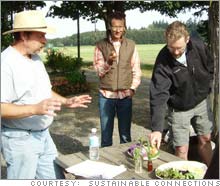|
'Small-Marts' take on Wal-Mart Small, local groups nationwide are fighting back against big business and helter-skelter globalization.
NEW YORK (Fortune) -- Local businesses in Whatcom County, Wash., next month will exhort their customers to "Buy Fresh Eat Local." Some people in the scenic, mountainous region will take a pledge to nourish themselves for a week entirely from the local food shed - drinking milk from local cows, eating fresh-baked organic bread and patronizing restaurants like Flats Tapas Bar, which will serve such dishes as flatbread with all-local smoked salmon, caramelized apple, gouda cheese and hazelnuts.
Others will enjoy the Downtown Carrot Jubilee, a chance to taste local carrots harvested that day; they'll wear "I Ate Local Today" stickers. "We want to help raise awareness of the value of local food systems," explains Max Morange of Sustainable Connections, a network of more than 500 Bellingham-area businesses that sponsors the annual event. "We're losing farmland very quickly." So committed to localism is Morange, a 25-year-old slow-food activist, that last year he churned his own butter rather than buy spread "imported" from elsewhere. The campaign is a stunt, to be sure, but it's also evidence of a backlash - against look-alike chain stores and helter-skelter globalization. Groups like Sustainable Connections have taken root in a variety of places, including downtown Philadelphia, the coast of Maine, rural St. Lawrence County in New York, Santa Fe and Ithaca, N.Y. About 20 local networks have affiliated with a national business group called BALLE - the Business Alliance for Local Living Economies - that was formed just five years ago. How local businesses can fight back One of the leading thinkers about the new localism is Michael Shuman, a BALLE board member, Stanford-educated lawyer and economist and author of a lively, new book called "The Small-Mart Revolution: How Local Businesses are Beating the Global Competition" (Berrett-Koehler, 2006). The subtitle is hyberbolic. Last time we checked, shoppers were leaving Main Street merchants to save money at Wal-Mart, independent bookstores were struggling to compete with Amazon and Barnes & Noble and global giants were swallowing regional banks. But Shuman tries to show how local firms can do battle with the global giants. "There's an awful lot of misunderstanding about small business," Shuman says. "Small-marts are responsible for most of a typical community's economy." He's got a point. Firms with fewer than 500 employees account for about half of private sector employment in the United States. But between 1990 and 2001, about 4 percent of jobs shifted from very small to large firms, a trend Shuman argues can be slowed down and even reversed. In "Small-Mart Revolution," Shuman identifies eight "deglobalizing" trends that he says will help local businesses compete. They include rising energy costs, the inefficiencies of global distribution, consumer desires for more personalized services and the growing loyalty of workers to small, local firms. You can see these forces coming into play already. As shipping costs increase, it doesn't make much sense to ship potatoes from Idaho to remote corners of America where farmers can grow their own. Local, small-scale sources of fuel - from wind farms to solar panels to cellulosic ethanol to methane gas digesters - look more attractive when oil sells for $70 a barrel. Shuman also makes a compelling case that the tax breaks and government subsidies that flow to big companies are not just a waste of taxpayer money, but an unfair burden for small, local, loyal companies. "The playing field is tilted like a double black diamond ski slope against locally-owned business," Shuman writes. To counter the market power of giants like Wal-Mart and Home Depot, Shuman says that small-marts have to join together and consumers have to become more aware of the impact of their spending and investing choices. That's what's happening in Bellingham. Sustainable Connections publishes a coupon book called "Where the Locals Go" that features discounts from more than 160 businesses. The group sponsors workshops on green building, featuring local contractors. It promotes renewable energy with Puget Sound Energy (Charts), the local utility company that operates one wind farm and is building another. While this example of a self-supporting economy is appealing, Shuman's book raises thorny questions. Can "local first" work for all cities and towns? Is it even a desirable goal? Local businesses, after all, are not likely to develop a Boeing 747, an iPod, Google or a Blackberry Green Tea Frappuccino. Nor are local businesses necessarily better for the world than global ones, especially as big companies embrace socially-responsible practices. Maybe the toughest issue raised by the new localism is its potential to morph into protectionism, slamming the door on exports from poor countries and hindering their efforts to grow. To his credit, Shuman addresses this issue at length. He argues that the developing world will benefit by developing small-scale local businesses rather than relying on exports to the west. But he doesn't want to go too far. "If I felt communities were going to shut their door to the rest of the world," he says, "I'd stop doing what I'm doing." Instead, he's trying to start a small-scale chicken business called Bay Friendly Chicken ("Better Bird, Better Taste, Better Bay") with chicken growers in the Delmarva Peninsula, so-called because it cuts across Delaware, Maryland and Virginia. The company will pay living wages, give ownership stakes to farmers and sell natural, air-chilled chickens. It sounds great, but don't expect to see Bay Friendly Chickens in the supermarket anytime soon - unless you live near the Chesapeake Bay. ____________________ 4 myths of the real estate bubble: Fortune's Shawn Tully on why the numbers will get worse. Insurance companies take on global warming: It's past time for the industry that rated vehicle safety and lobbied for building codes to address climate change. |
|


